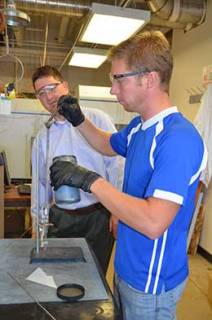Sep 18 2014
After graduating from Northern Kentucky University with bachelor’s degrees in chemistry and accounting, Allen Morris decided to pursue graduate studies at the University of Wyoming for two primary reasons: the Rocky Mountain lifestyle, and an attractive stipend from UW’s School of Energy Resources (SER).
 University of Wyoming graduate student Allen Morris works in a laboratory in the UW College of Engineering and Applied Science, while Associate Professor Joe Holles watches. The two are researching the use of a catalytic process to produce liquid fuel from biorenewable sources, through a research stipend from UW’s School of Energy Resources. (UW Photo)
University of Wyoming graduate student Allen Morris works in a laboratory in the UW College of Engineering and Applied Science, while Associate Professor Joe Holles watches. The two are researching the use of a catalytic process to produce liquid fuel from biorenewable sources, through a research stipend from UW’s School of Energy Resources. (UW Photo)
Two years later, Morris is nearing completion of a Ph.D. in chemical engineering, equipped with skills and experience that should help him land a position in the energy sector. Meanwhile, UW and Wyoming stand to benefit from his pioneering research on producing liquid fuels from biorenewable sources, as the catalytic process he’s advancing potentially could augment future production of synthesis gas from the state’s coal and natural gas.
The dual benefits of Morris’s time at UW represent exactly the purpose envisioned with the creation of SER’s competitive graduate assistantship program in 2007. The program has attracted dozens of top graduate students from across the country to UW to conduct research that benefits Wyoming’s industries and economy.
“Allen’s work has the potential to contribute to the creation of a hybrid syngas from biorenewable and conventional fuels that would be a significant value-added product,” says Joe Holles, associate professor in the UW Department of Chemical and Petroleum Engineering who has supervised Morris’s research. “It would leverage conventional energy sources in Wyoming for future uses and needs.”
Morris, who’s originally from rural Ohio, says he applied to a number of graduate schools in the Rocky Mountain region after his education at Northern Kentucky, with an eye on both research opportunities and quality of life. A competitive bicycle road racer, he determined that UW had the most to offer on both counts. It didn’t hurt that Holles reached out to him as well.
“The university has been great,” Morris says of his time at UW, praising his research support, advising and opportunities through SER, including its regular seminars featuring industry leaders. “I am very comfortable here.”
Although Morris hasn’t yet lined up post-Ph.D. employment, Holles is confident his graduate student’s wide skill set and experiences will help him secure a desired job in the energy industry.
Lactose to fuel
Morris’s research project has its origins with Holles who, before coming to UW four years ago, was on the Michigan Technological University faculty and learned that the cheese industry in the Upper Midwest produces large amounts of waste in the form of cheese whey. Lactose is a component of cheese whey, and Holles decided to explore the idea of converting the complex sugar into a biorenewable fuel.
The process involves catalysis -- introducing a substance to accelerate a chemical reaction. In particular, Holles wanted to find a catalyst that would drive the conversion of lactose and water into gasoline at relatively low temperatures, all in liquid form -- a practical necessity when dealing with sugars.
Morris has been experimenting with metal combinations -- platinum on nickel, and platinum on cobalt -- to serve as the catalyst. Working on the nano scale, both in the lab and through computer simulation, Morris has produced promising results.
The research has shown that the metal combinations are effective catalysts to convert lactose to liquid fuel. In fact, the combinations are essentially creating electrical hybrids, analogous to forming new elements with unique electronic behavior -- as measured in their impact at the atomic level during testing at the Argonne National Laboratory near Chicago.
Holles says the findings from Morris’s work could be applied to convert other types of sugars into liquid fuel. The research also stands to benefit the petroleum industry, as the combined metal catalysts could reduce the amounts of platinum needed in the cracking units of traditional oil refineries, cutting costs significantly.
“This technology could be introduced into about any catalytic process,” Holles says.
In and of itself, converting lactose to liquid fuel likely wouldn’t significantly contribute to solving the nation’s energy problems, Holles says. He has calculated that, if all of the lactose produced as waste from the nation’s cheese producers were turned into gasoline, it would equal only 10 percent of the nation’s ethanol production. But the technology definitely could contribute to U.S. efforts on biorenewable fuel production.
In addition, lactose-derived syngas could be combined with syngas from coal or natural gas, adding value through the addition of liquid petroleum to Wyoming’s normally “dry” gas -- which lacks significant volumes of heavier hydrocarbons such as propane and butane.
Holles hopes to use Morris’s research to obtain federal funding to continue advancing the technology.
“This is a good example of how science, through real-world applications, can be used to address a topical, pressing issue,” Holles says.
SER Associate Director Don Roth says it’s an example of how SER’s graduate assistantship program has the potential to drive innovation in all areas of Wyoming’s wide array of energy sources.
“Our graduate students are studying topics, including natural gas production economics, storage of different types of energy, carbon dioxide storage, enhanced coal technologies, wind farm design, enhanced oil recovery and much more,” Roth says. “It’s all part of the university’s effort to help the state’s economy and way of life through technological innovation, workforce preparation and job creation.”